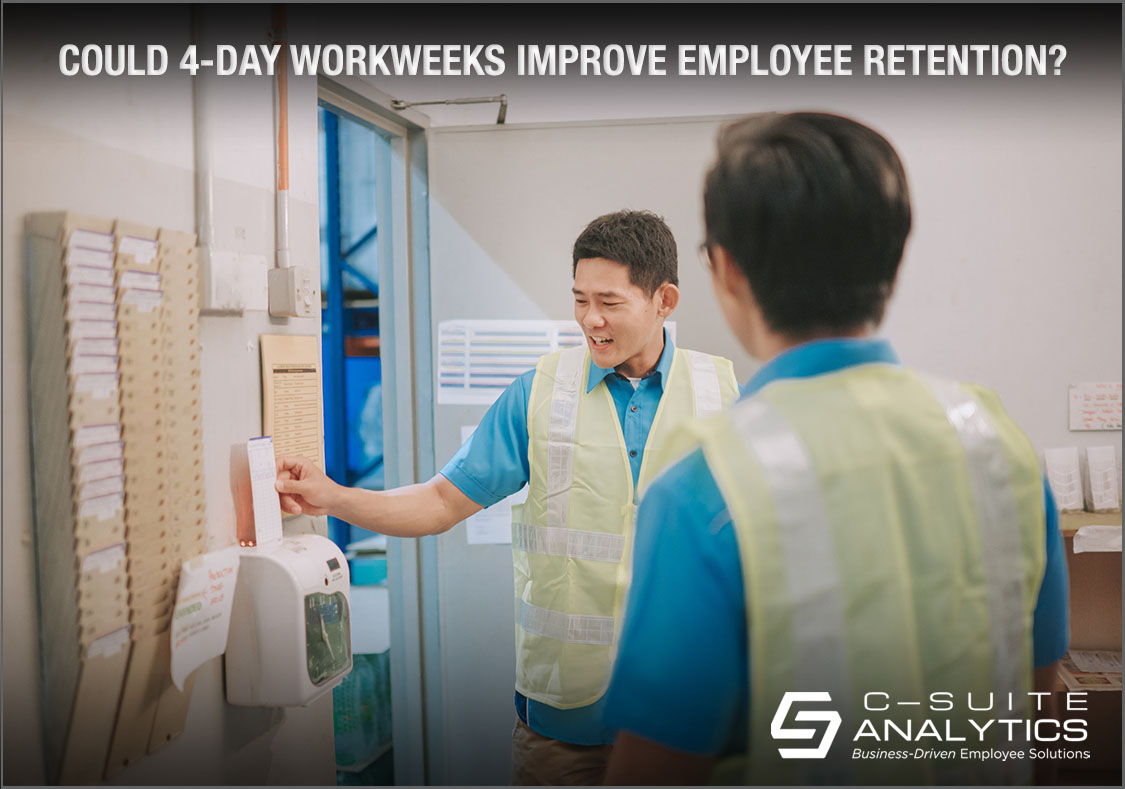Data shows a four-day workweek is popular with employees. On the company side, data suggests work satisfaction and productivity are up, recruiting is easier…and employee turnover is down. And during these days workforce shortages, every company is seeking a recruiting edge. Could this be “it”?
PROOF: Employees Talk About Their Bosses Over Dinner

I was in sunny San Diego on the Friday before Thanksgiving, helping a group of scientists learn how to conduct Stay Interviews. This client company produces life-saving chemicals, and the people in that room literally make it happen…a world-class smart bunch representing several continents and countries.
During our discussion, I mentioned my belief that what matters most regarding employee retention and engagement is what employees talk about over dinner. That this aggregation of the feelings we tell ourselves on our way home from work plus any subsequent conversations we have soon after ultimately predicts how long we will stay and how committed we are to our day-to-day work. These feelings might be generally positive so therefore we stay longer…or negative such that we join the millions of current employees who are seeking other jobs. Engagement surveys cannot tell you this, nor of course can exit surveys.
While we cannot sneak a microphone under their dinner tables…or in their cars, on their trains, in the bars they frequent after work, or the gyms where they pound a punching bag…what we can do is predict their subjects. And I predict those subjects are their bosses first, followed by their colleagues and then their daily job duties.
Forbes Magazine picked up on my thinking earlier this year and said this:
“Dick Finnegan, the Stay Interview expert, writes, ‘The greatest reason why employees quit is what they talk about over dinner’. Even those of us who love hard data must acknowledge this, which reinforces the old adage that people don’t quit jobs, they quit bosses. And it is those bosses they talk about over dinner.”
The joke line here is when someone asks “How was your day, dear?”, no one answers “My day was OK…but I just wish we had pet insurance”.
But back to our story. After stating my belief to this distinguished group, one man in the front row stood up and challenged this thinking, saying he tells his employees that once they leave work they should not think about their workdays at all, that work/life balance is critical to peace at home. As a result, he said, none of his employees would ever talk about him over dinner.
Now challenged in front of the group…that included the CEO…my initial thought was to say something like your team might be different although I believe most employees do indeed talk about their bosses over dinner. But instead, I took a chance and said this:
“Let’s poll the group. Please raise your hand high if in the last week you’ve talked about your boss over dinner.”
Of 24 remaining people in the room…many of whom reported to someone else in that room…24 hands immediately went up, all as the questioning manager and I looked on. We had proven our theory to the scientists…with science.
The room buzzed for 15 seconds or so, reminding me how important it is to test beliefs via polling so group participants can truly personalize what is being said to them. But more important is the point they made as a team, that in the presence of their own managers they declared “I talk about YOU over dinner”…so therefore it can be rightly assumed their employees talk about them over dinner, too.
Keep in mind, too, that these were senior leaders, senior scientists, not blue-collar workers who we typically associate with complaining about their jobs to others.
Those managers now know that each sentence they say and each decision they make might be served up with dinner that night. Will knowing this make them better leaders? Better communicators? Might they become more likely to provide encouragement and positive feedback versus remain silent and return to their own work? I think it will. Imagine a new hire returning home after the first day of work and telling her family all the things her new boss told her that she did really well!
Those managers…and your managers…have exponentially far more impact on how long their employees stay and how much they apply themselves based on this aggregation of going-home feelings. Please share this “Targeting Turnover” blog with them if improving retention and engagement is important to you and your top team.
Setting Q1 and 2022 retention and engagement goals? I’m happy to share insights to help you set the right course for retention, engagement, and real solutions – free of charge. Just email me at DFinnegan@C-SuiteAnalytics.com to set up a time to talk.



